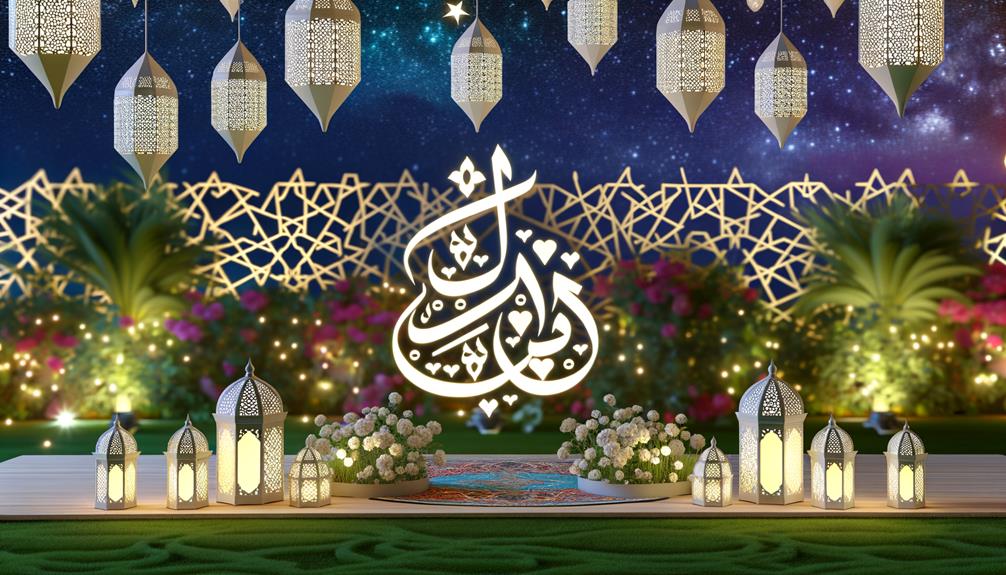Mona Name Meaning in Islam
In Islamic tradition, the name 'Mona' signifies 'wishes' or 'desires' in Arabic, embodying spiritual aspirations and inner purity. It reflects a profound divine connection, symbolizing a quest for spiritual fulfillment and balance.
Historically, individuals named Mona were revered for their piety and wisdom, highlighting deep moral virtues. The name plays a significant role in cultural and spiritual practices, uniting these values with everyday life.
This name is also present in various forms across different regions, such as 'Muna' and 'Mouna,' each carrying its unique attributes. To explore more dimensions of the name Mona, the following insights are invaluable.

Key Takeaways
- In Arabic, 'Mona' means 'wishes' or 'desires' and symbolizes hope and aspirations.
- 'Mona' signifies inner purity, spiritual fulfillment, and a harmonious soul in Islamic tradition.
- The name reflects a divine connection and heartfelt devotion in Islam.
- Historically, individuals named Mona were known for piety and wisdom in early Islamic history.
- Variations like 'Muna' and 'Mouna' carry similar meanings, emphasizing positive attributes in Islamic culture.
Etymology of Mona
The name 'Mona' has its roots in various languages and cultures, each contributing to its rich and diverse etymological history.
In Arabic, 'Mona' (منى) signifies 'wishes' or 'desires,' reflecting a deep cultural appreciation for aspirations and dreams.
In Irish and Gaelic traditions, 'Mona' is derived from the name 'Muadhnait,' meaning 'noble' or 'aristocratic.'
Additionally, in Sanskrit, 'Mona' translates to 'silence' or 'solitary,' suggesting a spiritual or introspective quality.
These varied origins underscore the multifaceted significance of the name across different societies.
Understanding the etymology of 'Mona' provides a nuanced appreciation of its meaning, emphasizing the interplay between language, culture, and personal identity.
This layered background enriches its resonance in diverse cultural contexts.
Cultural Significance
Exploring the cultural significance of the name 'Mona' reveals its profound impact and enduring presence across various societies, reflecting the diverse etymological roots discussed earlier. In Islamic cultures, the name 'Mona' is often associated with aspirations, desires, and wishes, symbolizing a hopeful and optimistic outlook. Its widespread use in both Arabic and Persian communities underscores its versatility and deep-rooted cultural resonance.
| Region | Cultural Significance |
|---|---|
| Middle East | Symbolizes hope and aspirations |
| South Asia | Commonly used in poetry and classical literature |
| North Africa | Represents beauty and grace |
| Western World | Associated with the famous ‘Mona Lisa' painting |
The multi-faceted nature of 'Mona' demonstrates its ability to transcend cultural boundaries while maintaining its intrinsic meanings.
Spiritual Resonance
The name Mona carries a profound spiritual resonance within Islamic tradition, often linked to a deep divine connection and the pursuit of inner peace.
Its significance is further enriched through cultural spiritual practices that emphasize the importance of names in shaping one's spiritual identity.
Understanding these layers reveals how the name Mona serves as a beacon of tranquility and spiritual fulfillment in Islamic culture.
Divine Connection Significance
In Islamic tradition, the name Mona carries a profound spiritual resonance, embodying a divine connection that signifies inner purity and heartfelt devotion. Rooted in Arabic origins, the name Mona (منى) translates to 'desire' or 'wish,' reflecting a deep yearning for spiritual fulfillment.
This name is often associated with individuals who possess a strong inclination towards spiritual practices and an unwavering dedication to their faith. Authentic Islamic texts highlight the significance of names and their spiritual implications, emphasizing that Mona encapsulates a divine aspiration towards a closer relationship with Allah.
This name, as such, is not merely a label but a reflection of one's spiritual journey and commitment to cultivating a life of piety and sincerity.
Inner Peace Symbolism
This profound spiritual resonance of the name Mona extends beyond divine connection, embodying a symbolism of inner peace and tranquility that aligns with Islamic teachings on spiritual contentment.
In Islam, achieving inner peace is an essential aspect of one's spiritual journey, often referred to as ‘Sakinah'. The name Mona, resonating with such profound tranquility, reflects the Islamic emphasis on inner serenity and the soul's harmonious state.
Authentic sources, such as the Hadith and Quran, emphasize the significance of cultivating inner peace through faith and righteous living. Mona's spiritual connotation serves as a reminder of the serene state that a devout believer aspires to attain, reinforcing the essence of contentment and spiritual balance within the Islamic tradition.
Cultural Spiritual Practices
Cultural spiritual practices in Islam often highlight the profound resonance of names like Mona, which embody deep spiritual meanings and serve as a conduit for fostering a stronger connection to the divine.
Names in Islamic tradition are not merely identifiers but are imbued with spiritual significance, reflecting virtues and divine attributes. Mona, meaning ‘wish’ or ‘desire,’ resonates with the Islamic ethos of aspiration towards piety and divine closeness. Likewise, the name Amina, meaning ‘trustworthy’ or ‘faithful’, embodies the importance of honesty and reliability in Islamic teachings. Names hold a deep significance in Islam, as they are believed to shape an individual’s character and destiny. The meaning of Emma in Islam reflects the importance of faith and belief, as it translates to ‘universal’ or ‘whole’.
Rituals, prayers, and daily recitations often incorporate such names to invoke blessings and spiritual fortitude. Authentic Islamic sources, including hadith and classical texts, emphasize the importance of selecting meaningful names, recognizing their role in shaping spiritual identity and reinforcing cultural values deeply rooted in the faith's spiritual heritage.
Historical Context
The historical context of the name Mona within Islamic culture can be traced back to early Islamic history, where it was often associated with noble and virtuous characteristics. The name Mona, in its Arabic origin, means 'desires' or 'wishes,' reflecting a deep sense of aspiration and hope.
Historical texts and Islamic literature frequently highlight individuals named Mona who were known for their piety, wisdom, and dedication to their faith. Such attributes made the name highly esteemed within the community.
Over time, Mona has maintained its positive connotations, symbolizing a blend of spiritual and moral virtues that resonate deeply within Islamic traditions. This rich historical backdrop continues to influence the name's popularity and significance in contemporary Islamic societies.
Variations and Spellings
Understanding the variations and spellings of the name Mona within Islamic contexts requires examining common name variations, regional spelling differences, and historical adaptations.
In Arabic, the name may appear as 'Muna,' reflecting phonetic nuances and cultural influences across different regions.
Historical adaptations further reveal how the name has evolved, demonstrating its rich and diverse legacy in Islamic heritage.
Common Name Variations
Many variations and spellings of the name Mona exist across different cultures and languages, reflecting its widespread appeal and historical significance.
In Arabic, it is often spelled 'Muna,' which means 'wishes' or 'desires.'
In Irish contexts, 'Mona' is sometimes used as a diminutive of 'Muadhnait,' meaning 'noble.'
Additionally, in Scandinavian countries, 'Mona' can be a short form of 'Monica,' a name with Latin roots meaning 'advisor.'
Each variation carries its own nuanced meanings and cultural connotations, yet they all share a common thread of positive attributes. Understanding these variations not only enriches our appreciation for the name Mona but also highlights its universal resonance and adaptability across different cultural landscapes.
Regional Spelling Differences
Across different regions, the name Mona exhibits a variety of spellings and phonetic adaptations that reflect the linguistic and cultural nuances of each area. These variations often arise from differences in alphabets, pronunciation conventions, and local dialects, providing rich insight into how the name is perceived and used worldwide.
Here are some common regional spellings:
- Muna: Mainly used in Arabic-speaking countries, highlighting the name's roots.
- Mona: Widely recognized in Western contexts, maintaining simplicity and ease of pronunciation.
- Mouna: Common in North African countries where French linguistic influence persists.
- Munah: A variation found in South Asia, reflecting local phonetic tendencies.
- Monna: A less common spelling, used in some European regions to align with native phonology.
These variations underscore the name's adaptability and cultural resonance.
Historical Name Adaptations
The diverse regional spellings of the name Mona are not only contemporary but also have historical roots that reflect the name's evolution through various cultures and languages over centuries. Originating from ancient languages, the name has been adopted and adapted by different societies, resulting in variations such as 'Muna' in Arabic, 'Monna' in Italian, and 'Mó na' in Irish.
Each adaptation carries unique cultural significance and phonetic nuances. For instance, 'Muna' in Arabic signifies a wish or desire, resonating deeply within Islamic traditions. Historical texts and records also reveal the name's prevalence in literature and royal lineages, further emphasizing its timeless appeal.
Such historical adaptations underscore the name Mona's rich, multifaceted heritage across the globe.
Famous Namesakes
Among the notable individuals who bear the name Mona, several have made significant contributions to various fields, underscoring the name's widespread influence and cultural resonance. These distinguished namesakes include:
- Mona Eltahawy, an award-winning Egyptian-American journalist and social commentator known for her bold writings on Arab and Muslim issues.
- Mona Simpson, an acclaimed American author and professor, celebrated for her novels and contributions to contemporary literature.
- Mona Sahlin, a prominent Swedish politician who has held several key government positions.
- Mona Barthel, a professional German tennis player who has competed at high levels in international tournaments.
- Mona Seif, an Egyptian human rights activist recognized for her work in advocating for civil liberties and social justice.
These individuals highlight the name Mona's global impact.
Choosing the Name Mona
Selecting the name Mona for a child involves careful consideration of its cultural significance, religious connotations, and the values it embodies within Islamic tradition.
Mona, derived from Arabic origins, means 'wishes' or 'desires,' reflecting a positive and hopeful sentiment. Parents might choose this name to symbolize their prayers and aspirations for their child's future.
In Islamic contexts, names carry deep spiritual significance, often reflecting virtues or invoking blessings. It is important to consult authentic sources such as Islamic scholars or trusted literature to confirm the name aligns with Islamic principles.
The thoughtful selection of Mona underscores a commitment to imbuing the child's identity with culturally and religiously resonant qualities that honor the family's faith and heritage.
Conclusion
In sum, the name Mona holds deep etymological roots, culturally significant meanings, and spiritual resonance within Islamic tradition.
Historically, it has been borne by remarkable individuals, further enriching its legacy.
The variations and spellings of Mona add to its multifaceted appeal.
As the adage goes, 'A name is a reflection of one's soul,' underscoring the profound consideration given when choosing the name Mona.
This name embodies a rich tapestry of historical and spiritual significance, making it a cherished choice.






